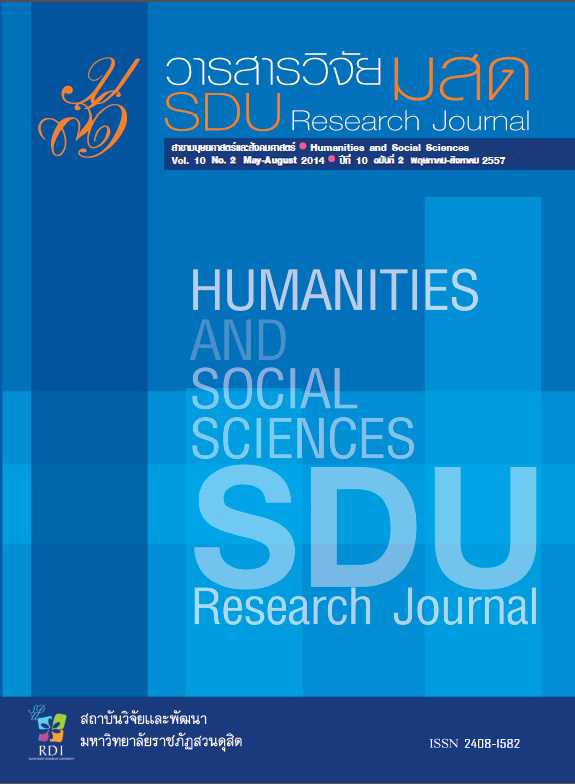องค์ประกอบการบริหารคุณภาพทั่วทั้งองค์การของมหาวิทยาลัยเอกชนในประเทศไทย
Keywords:
การบริหารคุณภาพทั่วทั้งองค์การAbstract
บทคัดย่อ
การวิจัยครั้งนี้มีวัตถุประสงค์เพื่อศึกษาองค์ประกอบการบริหารคุณภาพทั่วทั้งองค์การของมหาวิทยาลัยเอกชนในประเทศไทย และเพื่อตรวจสอบความสอดคล้องของโครงสร้างเชิงองค์ประกอบการบริหารคุณภาพทั่วทั้งองค์การของมหาวิทยาลัยเอกชนในประเทศไทย กับข้อมูลเชิงประจักษ์ กลุ่มตัวอย่างเป็นผู้บริหารมหาวิทยาลัย จำนวน 240 คน ใช้วิธีสุ่มตัวอย่างแบบสัดส่วน เครื่องมือที่ใช้ในการวิจัยครั้งนี้มี 3 ชุด คือ แบบสัมภาษณ์แบบมีโครงสร้างสำหรับสัมภาษณ์เชิงลึก แบบสอบถามเกี่ยวกับองค์ประกอบการบริหารคุณภาพทั่วทั้งองค์การของมหาวิทยาลัยเอกชนในประเทศไทย เป็นแบบมาตราส่วนประมาณค่า 5 ระดับ และแบบตรวจสอบรายการ โดยค่าความเชื่อมั่นของแบบสอบถามองค์ประกอบการบริหารคุณภาพทั่วทั้งองค์การของมหาวิทยาลัยเอกชนในประเทศไทย เท่ากับ 0.97 สถิติที่ใช้ในการวิเคราะห์ข้อมูลประกอบด้วย ค่าความถี่ ค่าร้อยละ ค่าเฉลี่ย ส่วนเบี่ยงเบนมาตรฐาน การวิเคราะห์องค์ประกอบเชิงสำรวจ การวิเคราะห์องค์ประกอบเชิงยืนยัน และการวิเคราะห์เนื้อหา
ผลการวิจัย พบว่า
1.ผลการวิเคราะห์องค์ประกอบเชิงสำรวจ พบว่า องค์ประกอบการบริหารคุณภาพทั่วทั้งองค์การของมหาวิทยาลัยเอกชนในประเทศไทย ประกอบด้วย 8 ด้าน ได้แก่ 1) การนำองค์การของผู้บริหาร 2) การวางแผนเชิงกลยุทธ์ 3) การให้ความสำคัญกับผู้รับบริการ และผู้มีส่วนได้ส่วนเสีย 4) การบริหารทรัพยากรมนุษย์ 5) การจัดการเทคโนโลยี นวัตกรรม และองค์ความรู้ 6) การจัดการระบบและกระบวนการ 7) การประเมินผลการดำเนินงาน และ 8) การปรับปรุงกระบวนการทำงานอย่างต่อเนื่อง
2. ผลการตรวจสอบความสอดคล้องของโครงสร้างเชิงองค์ประกอบการบริหารคุณภาพ ทั่วทั้งองค์การของมหาวิทยาลัยเอกชนในประเทศไทยกับข้อมูลเชิงประจักษ์ พบว่า ค่าวัดระดับความกลมกลืน คือ Chi-square (X2) = 593.060, df = 678, X2/df (CMIN/DF) = .875, RMR =.018, RMSEA = .000, GFI = .902, AGFI = .837, TLI=1.00 และ CFI = 1.00 แสดงว่า โมเดลการวิเคราะห์องค์ประกอบการบริหารคุณภาพทั่วทั้งองค์การของมหาวิทยาลัยเอกชนในประเทศไทยเชิงยืนยันลำดับที่สอง มีความสอดคล้องกับข้อมูลเชิงประจักษ์
3. องค์ประกอบการบริหารคุณภาพทั่วทั้งองค์การของมหาวิทยาลัยเอกชนในประเทศไทย ทั้ง 8 ด้าน มีความถูกต้องและครอบคลุม มีประโยชน์ มีความเป็นไปได้ในการนำไปใช้ และมีความเหมาะสมสอดคล้องกับแนวคิดทฤษฎีของการวิจัย
คำสำคัญ : การบริหารคุณภาพทั่วทั้งองค์การ
Abstract
The objectives of this research were to determine the components of Total Quality Management in Thai private universities, and to test the validity of the structure equation model of Total Quality Management in Thai private universities with the empirical data. The sample was consisted of 240 executives in thai private universities. The Proportional sampling method was used for sampling. The three instruments employed in this research included structured interviews, questionnaires concerning the Components of Total Quality Management in Thai private universities and checklist form. The reliability of the questionnaire in the form of an alpha coefficient was 0.974 in terms of the Components of Total Quality Management. The statistical data analysis was conducted by means of frequency, percentage, mean, standard deviation, exploratory factor analysis, confirmatory factor analysis and content analysis.
The findings of this research were as follows:
1.The results of the Exploratory factor analysis for the components of Total Quality Management in Thai private universities were consisted of: 1) leadership, 2) strategic planning, 3) customer and stakeholders focus, 4) human resource management, 5) technology innovation and knowledge management, 6) system and process management, 7) evaluation performance and 8) continuous improvement.
2.The results of the confirmatory factor analysis for structural validity test of Total Quality Management in Private Universities in Thailand model showed that Chi-square (X2) = 593.060, df = 678, X2/df (CMIN/DF) = .875, RMR = .018, RMSEA = .000, GFI = .902, AGFI = .837, TLI = 1.00 and CFI = 1.00 indicated that the Total Quality Management in Private Universities in Thailand model was consistent with empirical data significantly.
3.The components of Total Quality Management in Private Universities in Thailand includes 8 component which were found accuracy, utility, feasibility and propriety were in accordance with the research theory.
Keywords: Total Quality Management








